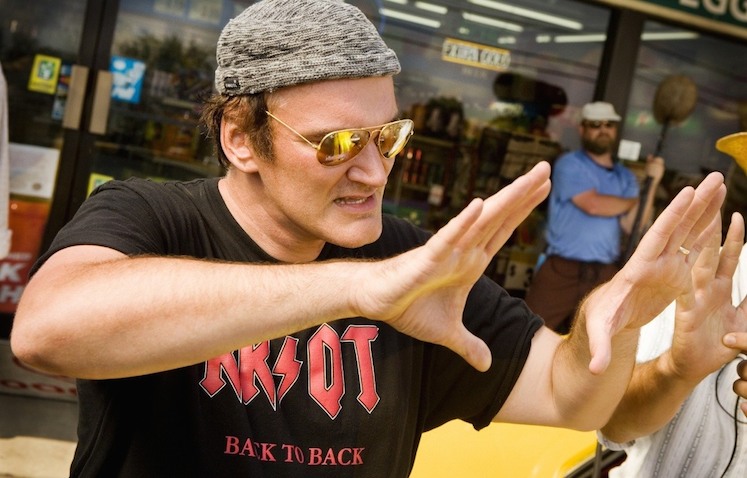 As Quentin Tarantino gears up his eighth film, "The Hateful Eight," he’s got a lot to think about. There’s the sprawling cast, the plans to shoot and project the film in 70mm, and the fact that production is beginning next month. But he’s also got his eye on a longer term goal — retirement — and he’s got a plan.
As Quentin Tarantino gears up his eighth film, "The Hateful Eight," he’s got a lot to think about. There’s the sprawling cast, the plans to shoot and project the film in 70mm, and the fact that production is beginning next month. But he’s also got his eye on a longer term goal — retirement — and he’s got a plan.
“I don’t believe you should stay on stage until people are begging you to get off,” he told distributors at AFM (via Deadline). “I like the idea of leaving them wanting a bit more. I do think directing is a young man’s game and I like the idea of an umbilical cord connection from my first to my last movie. I’m not trying to ridicule anyone who thinks differently, but I want to go out while I’m still hard…I like that I will leave a ten-film filmography, and so I’ve got two more to go after this. It’s not etched in stone, but that is the plan. If I get to the tenth, do a good job and don’t screw it up, well that sounds like a good way to end the old career. If, later on, I come across a good movie, I won’t not do it just because I said I wouldn’t. But ten and done, leaving them wanting more, that sounds right.”
And while it seems like every other filmmaker talks retirement at some point, this isn’t the first time Tarantino has talked about this plan. During the run-up to “Django Unchained” he stated about the ten film quota: “OK, it would sound really cool because it’s a round number and it would make sense as I would have made three movies per decade, but it’s not fixed in time. I still have some more things to do before being done with movies.”
So what would he do when he’s not filmmaking? Well, a couple of years back he said he wanted write novels and film criticism, and he’s already got books in the works about Sergio Corbucci (director of the original "Django"), George Roy Hill ("Butch Cassidy & the Sundance Kid," "The Sting") and Don Siegel. And again, he stated at AFM that he’ll be “writing plays and books, going gracefully into my tender years.”
But it’s not just his own legacy Tarantino is thinking about. He wants to shake up the industry before he goes, and it starts with "The Hateful Eight," which he hopes will offer a compelling counter-argument to the digital tide. “If we do our jobs right by making this film a 70 mm event, we will remind people why this is something you can’t see on television, and how this is an experience you can’t have when you watch movies in your apartment, your man cave or your iPhone or iPad,” Tarantino stated. “You’ll see 24 frames per second play out, all these wonderfully painted pictures create the illusion of movement. I’m hoping it’s going to stop the momentum of the digital stuff, and that people will hopefully go, ‘Man, that is going to the movies, and that is worth saving and we need to see more of that.’ ”
“I know this business has gone digital, even more in foreign countries than in America where it’s 90%,” he added. “Digital presentation is just television in public, we’re all just getting together and watching TV without pointing the remote control at the screen. I have worked 20 years, too long to accept the diminishing results of having it come into theaters with the quality of a f*cking DVD, shot with the same sh*t they shoot soap operas with. It’s just not good enough for me."
Aiming to create the kind of road show production from big spectacles from the 1960s, where movies would screen in large theaters and opera houses like an event, Tarantino lays out the release plan for "The Hateful Eight." “We’re doing this 70 mm, and we are trying to create an event,” Tarantino explained. “I need to know from all of you if this can last a month in your territory in that format, or two weeks. Then we roll it out in 35 and eventually digital. We’re not doing the usual 70 mm, where you shoot 35 mm and blow it up. We’re shooting 65 mm which, when you turn it into a print, is 70mm. Panavision is not only behind this movie, they look at it as a legacy.”
Lofty aspirations, indeed. But let’s hope the movie is worth the format first, right? Let us know what you think below.

